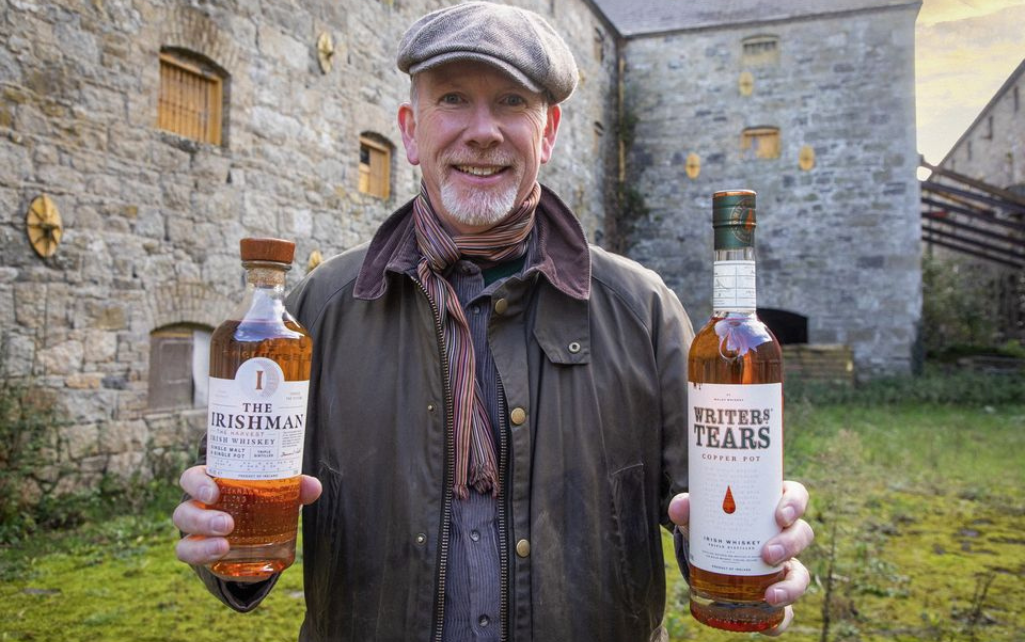Founder Q&A: Writers’ Tears

Crafted Pour recently sat down with Writers’ Tears, an Irish craft whiskey brand, to talk about their literature-based origins, the difference between Irish and American whiskey, and the future of whiskey in general.
Where does the name originate from, Writers’ Tears?
Writers' Tears story comes from the Golden Age of Irish literature, back around 1900 or so if I have to pick a year. Writers such as George Bernard Shaw, James Joyce, Lady Gregory, and Oscar Wilde – to name a few – would travel down to their local pub in search of inspiration to get through their writer's block. While they people watched, they'd often indulge in a few pours of whiskey – it was said that they enjoyed it so much, that when they cried, their tears were of whiskey. It was from this story that we took our name, inspired by those literary greats in the comfort of their local public houses.
Produced in Carlow, Ireland, I expect Writers' Tears hometown has quite an influence on its creation. What characteristics of the town do you find embodied in the whiskey?
While on the smaller size of Irish counties, Carlow is home to a robust agricultural sector where many cereal grains are grown, including barley. While not all of our gain comes from Carlow, all of our whiskeys are made from 100% Irish barley, whether malted or non-malted. Our delicious whiskeys are all reflective of the quality Irish barley that goes into every bottle – that of Carlow included.
For our North American audience, who is less familiar with Irish whiskey, what can they expect that's different from American whiskey?
From a general flavor profile, single malts don't have the same caramelized sugar and vanilla sweetness you often find in American whiskey, especially bourbon. While there may be undertones of this due to the prevalence of ex-bourbon barrels in the aging of Irish whiskey, you typically get notes of orchard fruits, especially green apples, for me. For fans of American ryes, however, you may find a familiar comfort with single pot still whiskey. While those brighter orchard fruits are still at the forefront, you'll get a spiciness on the finish that can be reminiscent of American rye.
Writers' Tears offers a diverse range of specialty whiskey styles and has been experimenting with different barrel aging, such as Marsala and Japanese casks. What trends and flavor profiles do you see that you're excited about for the future of whiskey?
Some may know this, but our founder, Bernard Walsh, was the first person to release a cask strength Irish whiskey in over 50 years via our portfolio mate, The Irishman. He has always found enjoyment in experimenting with various cask finishes, and that passion still exists. Additionally, Writers' Tears has always been a single pot still forward brand (making up at least 65% of our blended expressions), and we launched two new single pot still expressions in the past two years. I think you'll see us continue to experiment with new cask expressions within single pot still whiskey, especially as American consumers' familiarity with the category grows.
Tell us a little about the Walsh family and what they wanted to create with respect to Writers' Tears?
Writers' Tears grew out of Bernard's passion for making world-class Irish Whiskey – which he has been doing through The Irishman brand since 1999 – and his passion for literature. Our copper pot blend was based on what Shaw, Joyce, Wilde, etc. would have enjoyed at their local watering hole back in their days, so for him, Writers' Tears is an intersection of his own interests and passions.
Is there anything else we should know about Writers' Tears and what we might expect in the future?
As a nod to the great creatives of old, we strive to inspire a new generation of writers, especially in the Screenwriting community. We have partnered with the Writer's Guild of America for a few events, including their annual awards, and will be a main sponsor of this year's Austin Film Festival – America's largest gathering of Screenwriters in the US. On a smaller scale, we also seek to foster creativity in the local community, through sponsorship of open mic nights, poetry slams, etc.
